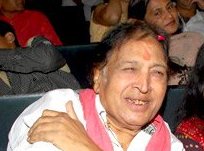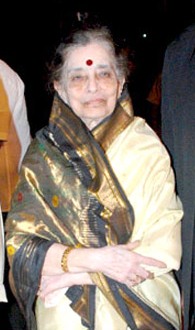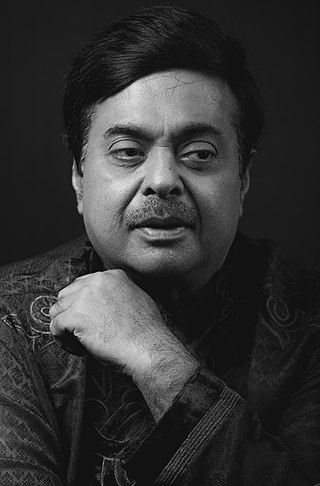
Hemanta Mukhopadhyay, known professionally as Hemant Kumar and Hemanta Mukherjee, was a legendary Indian music director and playback singer who primarily sang in Bengali and Hindi, as well as other Indian languages like Marathi, Gujarati, Odia, Assamese, Tamil, Punjabi, Bhojpuri, Konkani, Sanskrit and Urdu. He was an artist of Bengali and Hindi film music, Rabindra Sangeet, and many other genres. He was the recipient of two National Awards for Best Male Playback Singer and was popularly known as the "voice of God".

Lata Mangeshkar was an Indian playback singer and occasional music composer. She is considered to be one of the greatest and most influential singers of the Indian subcontinent. Her voice was one of the unifying elements of the people of India, Pakistan, Bangladesh and Nepal. Her contribution to the Indian music industry in a career spanning eight decades gained her honorific titles such as the "Queen of Melody", "Nightingale of India", and "Voice of the Millennium".

Asha Bhosle is an Indian playback singer, entrepreneur, actress and television personality who predominantly works in Indian cinema. Known for her versatility, she has been described in the media as one of the greatest and most influential singers in Hindi cinema. In her career spanning over eight decades she has recorded songs for films and albums in various Indian languages and received several accolades including two National Film Awards, four BFJA Awards, eighteen Maharashtra State Film Awards, nine Filmfare Awards including a Lifetime Achievement Award and a record seven Filmfare Awards for Best Female Playback Singer, in addition to two Grammy nominations. In 2000, she was honoured with the Dadasaheb Phalke Award, India's highest award in the field of cinema. In 2008, she was honoured by the Government of India with the Padma Vibhushan, the second-highest civilian honour of the country. The Guinness Book of World Records acknowledged Bhosle in 2011 as the most recorded artist in music history.

Jagjit Singh was an Indian composer, singer and musician. He composed and sang in numerous languages and is credited for the revival and popularity of ghazal, an Indian classical art form, by choosing poetry that was relevant to the masses and composing them in a way that laid more emphasis on the meaning of words and melody evoked by them. In terms of Indian classical music, his style of composing and gayaki (singing) is considered as Bol-pradhan, one that lays emphasis on words. He highlighted this in his music for films such as Prem Geet (1981), Arth (1982), and Saath Saath (1982), and TV serials Mirza Ghalib (1988) and Kahkashan (1991). Singh is considered to be the most successful ghazal singer and composer of all time in terms of critical acclaim and commercial success. With a career spanning five decades and many albums, the range and breadth of his work has been regarded as genre-defining.

Mohammed Zahur Khayyam Hashmi, better known mononymously as Khayyam, was an Indian music director and background score composer whose career spanned four decades.

Rai Chand Boral was an Indian composer, considered by music connoisseurs to be the Bhishma Pitamah, the father of film music in India.

Prabha Atre was an Indian classical vocalist from the Kirana gharana. She was awarded all three of the Padma Awards by the Government of India. She died after experiencing breathing difficulty in the early hours and was taken to Dinanath Mangeshkar Hospital. She died from cardiac arrest before reaching the hospital. Atre died on 13 January 2024, at the age of 91.

Rahul Deshpande is an Indian classical music singer and actor. He is the recipient of a National Film Award for his work in Me Vasantrao. He is the grandson of Vasantrao Deshpande.

Ustad Sultan Khan was an Indian sarangi player and classical vocalist belonging to Sikar Gharana. He was one of the founding members of the Indian fusion group Tabla Beat Science, with Zakir Hussain and Bill Laswell. He was awarded the Padma Bhushan, India's third highest civilian honour, in 2010.

Surinder Kaur was an Indian singer and songwriter. While she mainly sang Punjabi folk songs, where she is credited for pioneering and popularising the genre, Kaur also recorded songs as a playback singer for Hindi films between 1948 and 1952. For her contributions to Punjabi music, she earned the sobriquet Nightingale of Punjab, the Sangeet Natak Akademi Award in 1984, and the Padma Shri in 2006.

Suresh Ishwar Wadkar is an Indian playback singer. He performs in both Hindi and Marathi films. He has sung songs in some Bhojpuri films, Odia albums and bhajans and in Konkani films.

Arundhati Nag is an Indian actress. She has been involved with multilingual Theatre in India, for over 25 years, first in Mumbai where she got involved with Indian People's Theatre Association (IPTA), and did various productions in Gujarati, Marathi, and Hindi theatre, and then in Kannada, Tamil, Malayalam and English, in Bangalore.

Narendra Singh Negi, also referred as 'Garh Ratan' and 'Bob Dylan of the hills' is one of the most prominent folk singers, composer and a poet of the Garhwal and Uttarakhand who prominently sings in Garhwali language. Reportedly, he has sung more than 1000 songs. His unparalleled work in the field of folk music of Uttarakhand is an inspiration for all the upcoming singers of Uttarakhand.

Jaswinder Singh is an Indian ghazal singer. He is the son and student of Kuldip Singh, composer of ghazals such as ‘Tumko dekha to ye khayal aaya’ from the movie Saath Saath and ‘Itni Shakti Hame De Na Daata’ from Ankush.

Ustad Ghulam Mustafa Khan was an Indian classical musician in the Hindustani classical music tradition, belonging to the Rampur-Sahaswan Gharana.

Sulochana Mahadev Kadam, better known as Sulochana Chavan, was an Indian singer who was known for her lavanis in Marathi.

Shekhar Sen is a singer, a music composer, a lyricist, and an actor.

Sachin Dev Burman was an Indian music director and singer. A member of the Tripura royal family, he started his career with Bengali films in 1937. He later began composing for Hindi movies and became one of the most successful and influential Indian film music composers. Burman composed the soundtracks for over 100 movies, including Bengali films and Hindi.
Tapas Sen was a noted Indian stage lighting designer, who was an important figure in 20th-century Indian theatre. He started working with Bengali theatre movement in Kolkata in the late 1940s, along with noted directors, Utpal Dutt and Shambhu Mitra. Later he became a founding member of the Indian People's Theatre Association's (IPTA), Delhi chapter, and worked closely with Hindi theatre. Through his career stretching five decades he worked theatre directors, Ebrahim Alkazi, Vijay Tendulkar, and also dancers Sadhana Bose, Chandralekha, Birju Maharaj and Kelucharan Mahapatra. He was known not only for his creative stage lighting, but also had a significant impact on the work of leading theatre director of the time.
Rita Ganguly is an exponent in the Indian classical arts. An accomplished dancer, musician and vocalist, she was honoured with the Sangeet Natak Akademi Award in 2000 and with the Padma Shri in 2003. She is the mother of actress Meghna Kothari and the younger sister of the famous Ravindra Sangeet singer Gita Ghatak.

















